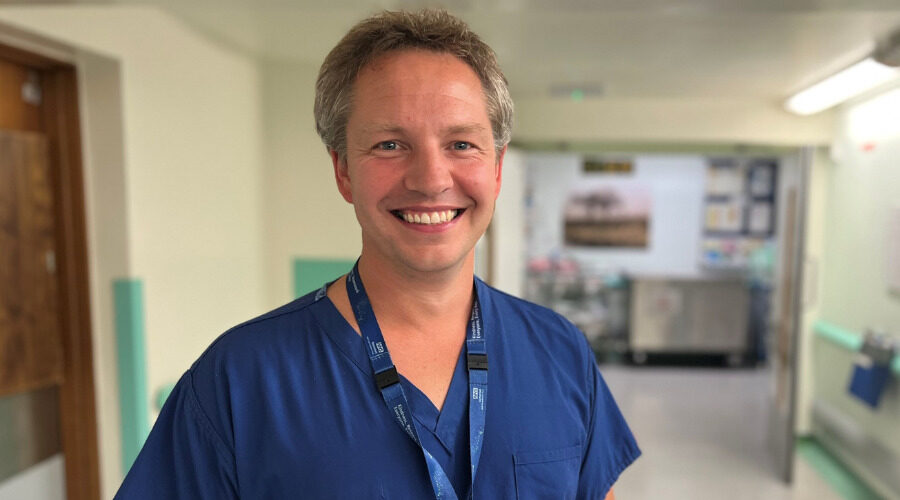
Spotlight
Consultant Richard Bamford talks all things robotic in his efforts to improve surgery
Richard Bamford is a consultant colorectal surgeon, who has worked at Musgrove Park Hospital for almost five years, most recently taking on a lead role for colorectal cancer, a service that he’s been working hard to improve.
Describing himself as a robotic surgery enthusiast, Richard played a huge part, alongside the hospital’s League of Friends, in bringing this type of innovative surgery to Musgrove Park. It has also been introduced at Yeovil Hospital.
It’s Richard’s outstanding efforts in these two areas that led to our executive team awarding him one of our Star of the Month awards back in April this year.
We spoke to Richard to find out more about the work that led to his award.
“It’s really nice to be recognised in this way by getting an Our Star award and just shows how appreciated the work we do is,” he said.
“It has been a busy few years in the field of colorectal surgery as we’ve been trying to improve the diagnosis, treatment and care for our patients by being selective when inviting them in for investigation.
“We’re doing this by making sure that we have the right screening tools available to help decide which patients need investigating, and how quickly.
“Part of this has included putting in place the latest national guidance on pre-hospital checks, such as more accurately testing for blood in a patients' poo before investigations. We’re looking to see what effect this has on our services so our patients can get a diagnosis within 28 days of being seen.
“Another important part is letting patients who don’t have cancer know as soon as possible, as we know it’s a hugely worrying time and anxious wait for them. If they’re sitting at home for a long time, despite a benign result, it can cause them psychological harm.”
Richard has reported that this new way of working has been successful so far, with our faster diagnosis team of nurses linking in with our GP colleagues to set up an education day, where they give advice on how to best refer a patient in for tests, and what to do if they’re unsure.
“We’ve made it much easier for our colleagues to triage our patients for the right tests,” he continued. “Our next step is to work with our investigation teams, such as radiology and endoscopy, to help get people through those tests as quickly as possible, and for those results to be processed and communicated back to the patient.
“Public awareness of bowel cancer has never been greater following a number of high profile celebrity deaths and a successful awareness campaign during April’s Bowel Cancer Month, which have inevitably led to more people being referred to our service.
“We see this as a really positive thing as it means more people will get that important diagnosis. In fact, we’re seeing almost double the number of patients since the death of Dame Deborah James in particular.
“But we knew that we needed to put in place a new clinical pathway that would be able to cope with this extra demand – and that’s something I set out to do.
“We appointed a colleague, Jess Barton, to take a lead role in our faster diagnosis service across the whole of Somerset. As a result of this increased capacity in the team, the number of patients we’re able to diagnose within 28 days has gone up from just 10% to around 75% - though we know there’s much more we need to do.
“I believe we now have a well-functioning team with very clear pathways, although we aren’t resting there as we are continually having improvement-focused meetings.”
The other area that Richard has been recognised for is his passion in helping to bring robotic surgery to MPH (it was also introduced at YDH shortly after).
“Our robotic surgery is going great at the trust too,” he added. “We performed our first cases in early summer at both Musgrove Park and Yeovil, beginning with upper GI and lower GI, David Mahon and Hamish Noble are our upper GI surgeons, and I cover lower GI with Tom Edwards.
“We’re operating on as many patients as we can with the robot and have really excellent dedicated theatre teams at both hospitals, who’ve been extensively trained, with the MPH team led by Noemi Eccles, who’s done a great job at bringing that team together.
“We’re now in the process of bringing in additional specialties, such as urology and gynae-oncology, so hopefully within less than a year of having the robot, it can be used every day for a different type of operation.
“From a patient’s point of view it’s making a huge difference as they’re able to go home much quicker and are experiencing less pain, and so far no significant complications, though we know it’s early days.
“From the surgeon’s point of view, while it can of course be mentally tiring, it doesn’t have the same physical demand as we aren’t stood up straight so it’s much more comfortable, enabling surgeons to operate for longer, both during the day and also in their careers.
“Our team at Yeovil are also offering colorectal surgery using a robot, and has started using it for upper GI procedures too.
“There was already a trained surgeon at Yeovil in Claudia, who has a fellowship in this area, and another surgeon is being trained up too, growing the potential at Yeovil and across the county.
“Everyone in the NHS works hard to improve their area and sometimes it’s just nice to know that it’s been seen by others and recognised.”
Thank you Richard for everything you’re doing in the field of surgery – you truly are a Star!
